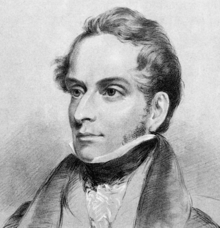Decimus Burton | |
|---|---|
 Burton by Sir Thomas Lawrence | |
| Born | 30 September 1800 North House, Southampton Terrace, Bloomsbury, London, England |
| Died | 14 December 1881 (aged 81) 1 Gloucester Road, Kensington, London, England |
| Resting place | Kensal Green Cemetery, London |
| Education | Tonbridge School |
| Alma mater | |
| Occupation | Architect |
| Notable work |
|
| Parents |
|
| Relatives |
|
Decimus Burton (30 September 1800 – 14 December 1881) was one of the foremost English architects and landscapers of the 19th century. He was the foremost Victorian architect in the Roman revival, Greek revival, Georgian neoclassical and Regency styles. He was a founding fellow and vice-president of the Royal Institute of British Architects, and from 1840 architect to the Royal Botanic Society, and an early member of the Athenaeum Club, London, whose clubhouse he designed and which the company of his father, James Burton, the pre-eminent Georgian London property developer, built.
Burton's works are Hyde Park, London (including the gate or screen of Hyde Park Corner, the Wellington Arch, and the Gates); Green Park and St James's Park; Regent's Park (including Cornwall Terrace, York Terrace, Clarence Terrace, Chester Terrace, and the villas of the Inner Circle which include his own mansion, The Holme, and the original Winfield House); the enclosure of the forecourt of Buckingham Palace from which he had Nash's Marble Arch moved; the clubhouse of the Athenaeum Club, London; Carlton House Terrace; Spring Gardens in St. James's; and the Palm House and the Temperate House at Kew Gardens. Burton designed the seaside towns of St Leonards-on-Sea, Fleetwood, and Folkestone, and also Royal Tunbridge Wells. His Calverley Estate (of which only a small proportion survives) was highly commended.
Burton was a member of London high society during the Georgian era and during the Regency era. He had close friendships with Princess Victoria (the future Queen Victoria); the Duchess of Kent; William Cavendish, 6th Duke of Devonshire, John Wilson Croker, and Sir Humphry Davy. The Burtons' London mansion, The Holme of Regent's Park, which was built by James's company to a design by his son Decimus Burton, was described by 20th century architectural critic Ian Nairn as 'a definition of Western civilization in a single view'. Burton also contributed to the design of their Tonbridge, Kent mansion, Mabledon.